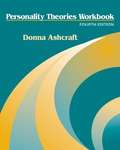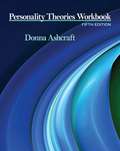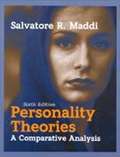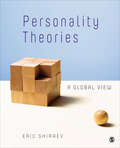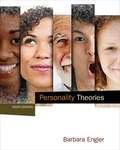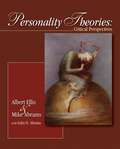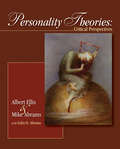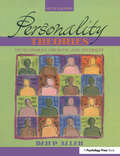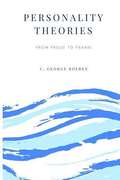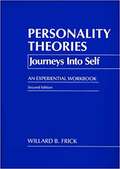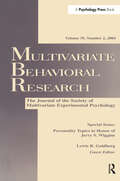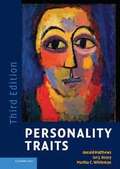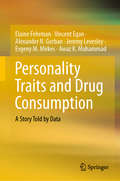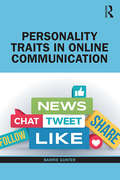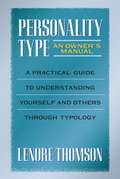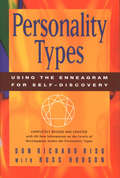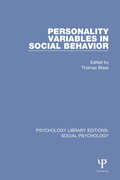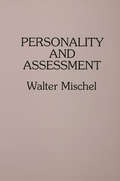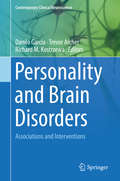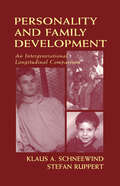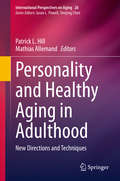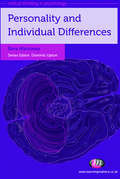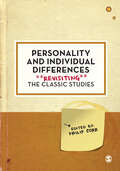- Table View
- List View
Personality Theories Workbook (4th edition)
by Donna AshcraftThe case studies in PERSONALITY THEORIES WORKBOOK, 4th edition, help you learn and apply personality theories to real-life examples of typical--rather than abnormal--behavior. While most personality texts present just the major concepts of personality theories, Donna Ashcraft's unique workbook ensures that you thoroughly understand examples and enables you to put theories into practice. The text's wide range of case studies is accompanied by questions that guide you through an analysis of the case, prompting you to consider how a particular theorist would view it. Additional exercises ensure that you understand the differences between each theory. Succinct, affordable, and accessible, PERSONALITY THEORIES WORKBOOK combines an excellent assortment of cases with critical-thinking questions and greater application of theories to your personal life. The result is solid understanding.
Personality Theories Workbook (5th Edition)
by Donna AshcraftThe case studies in PERSONALITY THEORIES WORKBOOK, 5e, help you learn and apply personality theories to real-life examples of typical--rather than abnormal--behavior. While most personality texts present just the major concepts of personality theories, Donna Ashcraft's unique workbook ensures that you thoroughly understand examples and enables you to put theories into practice. The text's wide range of case studies is accompanied by questions that guide you through an analysis of the case, prompting you to consider how a particular theorist would view it. Additional exercises ensure that you understand the differences between each theory. Succinct, affordable, and accessible, PERSONALITY THEORIES WORKBOOK, 5e, combines an excellent assortment of cases with critical-thinking questions and greater application of theories to your personal life. The result is solid understanding.
Personality Theories: A Comparative Analysis 6th Edition
by Salvatore R. MaddiThis well-organized text gives direction to students of personality in their efforts to understand the whole person. Maddi's conversational style encourages thinking instead of memorizing, thereby helping readers master principles rather than merely accepting the principles of one theory or another. He explains, compares, and contrasts a number of different personality theories to illuminate the overall models of human behavior they express.
Personality Theories: A Global View
by Eric ShiraevPersonality Theories: A Global View by leading scholar Eric Shiraev takes a dynamic, integrated, and cross-cultural approach to the study of personality. The text is organized around three general questions: Where did personality theories come from? How did the theorists study facts? How do we apply personality theories now? These questions provide a consistent focus on social context, interdisciplinary science, and applications. Going beyond traditional research from the Western tradition, the book also covers theories and studies rooted in the experiences of other countries and cultures.
Personality Theories: A Global View
by Eric ShiraevPersonality Theories: A Global View by leading scholar Eric Shiraev takes a dynamic, integrated, and cross-cultural approach to the study of personality. The text is organized around three general questions: Where did personality theories come from? How did the theorists study facts? How do we apply personality theories now? These questions provide a consistent focus on social context, interdisciplinary science, and applications. Going beyond traditional research from the Western tradition, the book also covers theories and studies rooted in the experiences of other countries and cultures.
Personality Theories: An Introduction, Student Edition (Cengage Advantage Books)
by Barbara EnglerThe Ninth Edition of PERSONALITY THEORIES continues to provide thorough coverage enhanced with helpful learning aids, opportunities for honing critical thinking skills, and integration of multicultural and gender-related issues. Each chapter focuses on one theory or group of theories and includes brief biographies that shed light on how the theories were formed. The author also provides criteria for evaluating each theory and cites current relevant research. A final chapter on Zen Buddhism covers a major non-Western theory of personality and serves to distinguish this program in the field.
Personality Theories: Critical Perspectives
by Albert Ellis Mike Abrams Lidia Dengelegi AbramsPersonality Theories: Critical Perspectives is the groundbreaking, final text written by Albert Ellis, long considered the founder of cognitive behavioral therapies. The book provides students with supporting and contradictory evidence for the development of personality theories through time. Without condemning the founding theorists who came before him, Ellis builds on more than a century of psychological research to re-examine the theories of Freud, Jung, and Adler while taking an equally critical look at modern, research-based theories, including his own.
Personality Theories: Critical Perspectives
by Albert Ellis Mike Abrams Dr Lidia Dengelegi AbramsPersonality Theories: Critical Perspectives is the groundbreaking, final text written by Albert Ellis, long considered the founder of cognitive behavioral therapies. The book provides students with supporting and contradictory evidence for the development of personality theories through time. Without condemning the founding theorists who came before him, Ellis builds on more than a century of psychological research to re-examine the theories of Freud, Jung, and Adler while taking an equally critical look at modern, research-based theories, including his own.
Personality Theories: Development, Growth, and Diversity (Mysearchlab Series 15% Off Ser.)
by Bem P. AllenThis text provides a comprehensive introduction to the key personality theorists by combining biographical information on each theorist with his or her contributions to the field, including her or his ranking among the world’s most respected psychologists. In addition, Allen provides a tabular format–that is, a running comparison between the major theorists, allowing students to analyze new theories against theories learned in previous chapters. The unique style of Allen's book is strengthened through his conversational tone, enabling students to easily grasp an understanding of the key people and movements in the field of personality.
Personality Theories: From Freud To Frankl
by C. George BoereePersonality psychology is the study of the person. As such, it is arguably the broadest, most "philosophical", branch of psychology. It involves an examination of the effects of genetics, the physical environment, culture, upbringing, trauma, pathology and more. In as much as this is clearly a huge undertaking, it is as much a matter of competing theories as it is of empirical research. For this reason, it remains a tradition in the field to look at various attempts over the last 100-plus years to tackle the issue: "What is it to be a person?" This book attempts to provide an open-minded review of the most important of these theories.
Personality Theories: Journeys Into Self - An Experiential Workbook
by Willard B. FrickThe author has revised this popular experiential workbook by adding Carl Jung and Karen Horney to his cast of major personality theorists—Freud, Adler, Erikson, Bandura, Allport, Maslow, and Rogers—who provide the context within which students explore aspects of their own private experience. Through exercises, projects, and group activities, students are given the means to relate abstract theories and concepts to their own personality development and experience. Many exercises deal with private aspects of students’ lives and are designed to be completed individually out of the classroom and reviewed by the instructor. Other classroom exercises involve working with peers in small-groups.
Personality Topics in Honor of Jerry S. Wiggins: A Special Issue of Multivariate Behavioral Research
by Lewis R. GoldbergFirst published in 2004. Routledge is an imprint of Taylor & Francis, an informa company.
Personality Traits
by Ian J. Deary Gerald Matthews Martha C. WhitemanNow in its third edition, this dynamic textbook analyses the traits fundamental to human personality: what they are, why they matter, their biological and social foundations, how they play out in human life and their consequences for cognition, stress and physical and mental health. The text also considers the applications of personality assessment in clinical, educational and occupational settings, providing the reader with a detailed understanding of the whole field of personality traits. This edition, now in 2-colour with improved student features, includes the latest research from behavioural genetics, neuroscience, social psychology and cognitive science, assesses the impact of new research techniques like brain imagery, and provides additional content on positive aspects of traits and practical uses of personality assessment. This is an essential textbook for students taking courses in personality and individual differences and also provides researchers and practitioners with a coherent, up-to-date survey of this significant area.
Personality Traits and Drug Consumption: A Story Told by Data (SpringerBriefs in Statistics)
by Alexander N. Gorban Jeremy Levesley Elaine Fehrman Vincent Egan Evgeny M. Mirkes Awaz K. MuhammadThis book discusses the psychological traits associated with drug consumption through the statistical analysis of a new database with information on 1885 respondents and use of 18 drugs. After reviewing published works on the psychological profiles of drug users and describing the data mining and machine learning methods used, it demonstrates that the personality traits (five factor model, impulsivity, and sensation seeking) together with simple demographic data make it possible to predict the risk of consumption of individual drugs with a sensitivity and specificity above 70% for most drugs. It also analyzes the correlations of use of different substances and describes the groups of drugs with correlated use, identifying significant differences in personality profiles for users of different drugs. The book is intended for advanced undergraduates and first-year PhD students, as well as researchers and practitioners. Although no previous knowledge of machine learning, advanced data mining concepts or modern psychology of personality is assumed, familiarity with basic statistics and some experience in the use of probabilities would be helpful. For a more detailed introduction to statistical methods, the book provides recommendations for undergraduate textbooks.
Personality Traits in Online Communication
by Barrie GunterAuthoritative and illuminating, this book demonstrates how we reveal the secrets of our character through the disclosures we make about ourselves in the online world. The author expertly explores whether online information about people, derived from their search patterns, personal detail disclosures and the language they use when posting text, are all related to their personalities. The Internet era has given rise to an enormous explosion of data that is refreshed daily on a massive scale. The growth of online social network sites has created opportunities for more and more people to reveal intimate details about themselves and their lives. While some of these disclosures are consciously made, other, more subtle forms of person profiling can be produced by examining patterns in our online behavior and the language we use in our online posts. As this book will show, techniques have been developed which enable researchers to build detailed personality profiles of people without their awareness, by examining online behaviour and psycholinguistic analysis. Establishing how unlocking the full potential of ‘big data’ is dependent on having the right analytical tools that can be applied speedily and cost-effectively on a massive scale, the author also asks how powerful these methods are, and can they really be used to influence us in the way their critics fear and proponents claim. Explaining how we reveal the secrets of our character through the disclosures we make about ourselves in the online world, this is fascinating reading for students and academics in psychology, linguistics, computer science, and related areas.
Personality Type
by Lenore Thomson"The type test inside will tell you about the choices you've made and the direction you're taking--according to C. G. Jung's theory of psychological types. For Jung, knowing your type was essential to understanding yourself: a way to measure personal growth and change. But his ideas have been applied largely in the areas of career and marital counseling, so type has come to seem predictive: a way to determine your job skills and social abilities. This book reclaims type as a way to talk about people's inner potential and the choices they make in order to honor it. Using everyday examples from popular culture--films, "Star Trek," soap operas, comic strips--it describes the sixteen basic ways people come to terms with their gifts and values. In this book you will find tools to understand: * How your personality takes shape * How your type reflects not only your current priorities, but your hidden potential * How unlived possibilities are trying to get your attention * How relationships at home and at work can help you to tap your unrealized gifts Whether you're trying to figure out who you are and what you need to do in life, or recognizing that deeper meaning lies beyond what you've already accomplished, this book will help you to become aware of your greatest strengths, your opportunities to live them out, and your ability to make the most of your unique potential." Lenore Thomson, M.Div., has written extensively on theology and psychoanalysis for the past twenty-five years. Formerly managing editor of the Jungian journal Quadrant, she has taught courses on psychological types and popular culture at the C. G. Jung Foundation in New York City.
Personality Types: Using the Enneagram for Self-Discovery
by Don Richard Riso Russ HudsonThe definitive guide to using this ancient psychological system to gain self-knowledge and achieve personal growth—now expanded and revised. The Enneagram is an extraordinary framework for understanding more about ourselves. No matter from which point of view we approach it, we discover fresh conjunctions of new and old ideas. So writes Don Riso in this expanded edition of his classic interpretation of the Enneagram, the ancient psychological system used to understand the human personality. In addition to updating the descriptions of the nine personality types, Personality Types, Revised greatly expands the accompanying guidelines and, for the first time, uncovers the Core Dynamics, or Levels of Development, within each type. This skeletal system provides far more information about the inner tension and movements of the nine personalities than has previously been published. This increased specificity will allow therapists, social workers, personnel managers, students of the Enneagram, and general readers alike to use it with much greater precision as they unlock the secrets of self-understanding, and thus self-transformation. &“No Enneagram teachers I&’ve come across offer such a rich and dynamic picture of how each personality type expresses itself in the world, and the process by which we can move through progressive stages of psychological and spiritual growth.&”—Tony Schwartz, author of What Really Matters: Searching for Wisdom in America
Personality Variables in Social Behavior (Psychology Library Editions: Social Psychology)
by Thomas BlassOriginally published in 1977, the aim of this volume was to demonstrate in a concrete way the relevance of some of the most important individual variables for various domains of social behaviour. Eminent researchers at the time contributed original chapters that provided an up-to-date perspective on theory and research on important and widely used personality constructs. This volume should serve as a text for advanced level students seeking a historical introduction to specific personality variables and a survey of theory and research on the most widely used personality dimensions of the time.
Personality and Assessment
by Walter MischelAfter many "out-of-print" years, this volume has been reissued in response to an increasing demand for copies. This reflects that the fundamental questions that motivated this book thirty years ago are still being asked. But more important, the answers -- or at least their outlines -- now seem to be in sight. In 1968, this book stood as an expression of a paradigm crisis in its critique of the state of personality psychology. The last three decades have been filled with controversy and debate about the dilemmas raised here, and then with renewal and fresh discoveries. It therefore seems especially timely to revisit the pages which posed the challenges. Mischel outlined the need to encompass the situation in the study of personality, but with a focus on the acquired meaning of stimuli and on the situation as perceived, viewing the individual as a cognitive-affective being who construes, interprets, and transforms the stimulus in a dynamic reciprocal interaction with the social world. He focused on the idiographic analysis of personality that had originally motivated the field, and the complexity, discriminative facility, and uniqueness of the individual, and sought to connect the expressions of personality to the individual's behavior -- that is, to what people do and not just what they say. Even the intrinsically contextualized "if...then..." expressions of the personality system -- its essential behavioral signatures -- were foreshadowed in this book that fired the opening salvo in a search for "a truly dynamic personality psychology."
Personality and Brain Disorders: Associations and Interventions (Contemporary Clinical Neuroscience)
by Richard M. Kostrzewa Trevor Archer Danilo GarciaBrain disorders (neurodevelopmental, neurodegenerative, and affective disorders) can be investigated, treated, and prevented using person-centered methods. Because researchers have not reached a clear consensus on whether or not personality is stable or changeable, it has been difficult to outline how to use these methods in the care of people with brain disorders. Thus, the first part aims to identify the ways in which brain disorders and personality are linked. The second part explores different person-centered approaches that can be incorporated in a healthcare or education setting to help people with various brain disorders and to promote physical, mental and social health. The third part focuses on challenges and new venues.
Personality and Family Development: An Intergenerational Longitudinal Comparison
by Klaus A. Schneewind Stefan Ruppert Klaus SchneewindThis unique volume presents the results of a study of 200 German families over a period of 16 years from 1976 to 1992. This study--the findings of which yield a host of new insights into the dynamics of cross-generational personality and family development--is based on an ecopsychological framework comprising four levels of developmental analyses: * individual level--personality development, critical life events, and corresponding coping strategies; * dyadic relationships level--changes in parent-child relationships across time and development of marital relationships; * family relationship level--development of family climate and its impact on current dyadic relationships; and * contextual/ecological level--perceived changes in societal conditions, corresponding patterns of personality and coping strategies. The authors focus on the important ideas and keep methodological details to a minimum in the text. Technical issues having to do with data analysis, etc., are discussed in an appendix.
Personality and Healthy Aging in Adulthood: New Directions and Techniques (International Perspectives on Aging #26)
by Patrick L. Hill Mathias AllemandThis book highlights international efforts to better understand the role of individual differences in healthy aging by exploring new directions, methods, and questions within the field. The book considers how to measure personality and personality change during adulthood, the associations between personality and healthy aging outcomes over time, and the role of personality in building interventions to promote healthy aging. The first section considers the value of personality constructs for healthy aging outcomes beyond the broad Big Five personality dimensions. It discusses the role of attachment, purpose, and affect, and also touches on the issue of psychopathology. The second section presents innovative assessment methods, research designs beyond classical longitudinal approaches, as well as sophisticated and integrative techniques for analyzing personality change processes. The third section raises new important questions, such as how interventionists from non-personality domains can incorporate personality processes in their intervention programs. It also discusses how different domains of individual functioning may interact in concert to predict healthy aging outcomes, as well as how more integrative lifespan models of healthy aging may advance research on personality and healthy aging. Overall, this book will spark interest and chart new directions for researchers, practitioners and interventionists in healthy aging, gerontology and applied fields.
Personality and Individual Differences
by Bere MahoneyThis accessible introductory text covers core domains of variation in individual differences: the history, philosophy and methods used in individual differences psychology, personality, intellect, affect and the self. It provides concise and focused coverage of the central concepts, research and debates in this key area, while developing students' higher level skills. Activities help readers build the underpinning generic critical thinking and transferable skills they need to become independent learners, and to meet the requirements of their programme of study.
Personality and Individual Differences: Revisiting the Classic Studies (Psychology: Revisiting the Classic Studies)
by Philip CorrRevisiting the Classic Studies is a series of texts that introduces readers to the studies in psychology that changed the way we think about core topics in the discipline today. It provokes students to ask more interesting and challenging questions about the field by encouraging a deeper level of engagement, both with the details of the studies themselves and with the nature of their contribution. Edited by leading scholars in their field and written by researchers at the cutting edge of these developments, the chapters in each text provide details of the original works and their theoretical and empirical impact, and then discuss the ways in which thinking and research has advanced in the years since the studies were conducted. Personality and Individual Differences: Revisiting the Classic Studies traces 14 ground-breaking studies by researchers such as Hans Eysenck, Raymond Cattell, Ernest Tupes and Raymond Christal to re-examine and reflect on their findings and engage in a lively discussion of the subsequent work that they have inspired.
Personality and Individual Differences: Revisiting the Classic Studies (Psychology: Revisiting the Classic Studies)
by Professor Philip CorrRevisiting the Classic Studies is a series of texts that introduces readers to the studies in psychology that changed the way we think about core topics in the discipline today. It provokes students to ask more interesting and challenging questions about the field by encouraging a deeper level of engagement, both with the details of the studies themselves and with the nature of their contribution. Edited by leading scholars in their field and written by researchers at the cutting edge of these developments, the chapters in each text provide details of the original works and their theoretical and empirical impact, and then discuss the ways in which thinking and research has advanced in the years since the studies were conducted. Personality and Individual Differences: Revisiting the Classic Studies traces 14 ground-breaking studies by researchers such as Hans Eysenck, Raymond Cattell, Ernest Tupes and Raymond Christal to re-examine and reflect on their findings and engage in a lively discussion of the subsequent work that they have inspired.
